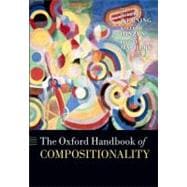
Note: Supplemental materials are not guaranteed with Rental or Used book purchases.
Purchase Benefits
Looking to rent a book? Rent The Oxford Handbook of Compositionality [ISBN: 9780199541072] for the semester, quarter, and short term or search our site for other textbooks by Werning, Markus; Hinzen, Wolfram; Machery, Edouard. Renting a textbook can save you up to 90% from the cost of buying.
| List of Abbreviations | p. ix |
| Acknowledgements | p. xi |
| The Contributors | p. xii |
| Introduction | p. 1 |
| History and Overview | |
| Compositionality: its historic context | p. 19 |
| Compositionality in Montague Grammar | p. 47 |
| The case for compositionality | p. 64 |
| Compositionality problems and how to solve them | p. 81 |
| Compositionality in Language | |
| Direct Compositionality | p. 109 |
| Semantic monadicity with conceptual polyadicity | p. 129 |
| Holism and compositionality | p. 149 |
| Compositionality, flexibility, and context dependence | p. 175 |
| Compositionality in Kaplan style semantics | p. 192 |
| Sub-compositionality | p. 220 |
| Compositionality in Formal Semantics | |
| Formalizing the relationship between meaning and syntax | p. 245 |
| Compositionality and the Context Principle | p. 262 |
| Compositionality in discourse from a logical perspective | p. 279 |
| Lexical Decomposition | |
| Lexical decomposition in grammar | p. 307 |
| Lexical decomposition in modern syntactic theory | p. 328 |
| Syntax in the atom | p. 351 |
| Co-compositionality in grammar | p. 371 |
| The Compositionality of Mind | |
| Typicality and compositionality: the logic of combining vague concepts | p. 385 |
| Emergency!!!! Challenges to a compositional understanding of noun-noun combinations | p. 403 |
| Can prototype representations support composition and decomposition? | p. 418 |
| Regaining composure: a defence of prototype compositionality | p. 437 |
| Simple heuristics for concept combination | p. 454 |
| Evolutionary and Communicative Success | |
| Compositionality and beyond: embodied meaning in language and protolanguage | p. 475 |
| Compositionality and linguistic evolution | p. 493 |
| Communication and the complexity of semantics | p. 510 |
| Prototypes and their composition from an evolutionary point of view | p. 530 |
| Neural Models of Compositional Representation | |
| Connectionism, dynamical cognition, and non-classical compositional representation | p. 557 |
| The Dual-Mechanism debate | p. 574 |
| Compositionality and biologically plausible models | p. 596 |
| Neuronal assembly models of compositionality | p. 616 |
| Non-symbolic compositional representation and its neuronal foundation: towards an emulative semantics | p. 633 |
| The processing consequences of compositionality | p. 655 |
| References | p. 673 |
| Index | p. 725 |
| Table of Contents provided by Ingram. All Rights Reserved. |
The New copy of this book will include any supplemental materials advertised. Please check the title of the book to determine if it should include any access cards, study guides, lab manuals, CDs, etc.
The Used, Rental and eBook copies of this book are not guaranteed to include any supplemental materials. Typically, only the book itself is included. This is true even if the title states it includes any access cards, study guides, lab manuals, CDs, etc.